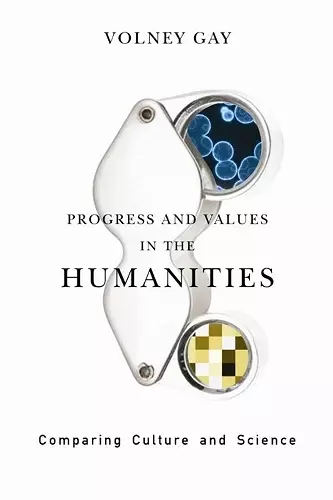Progress and Values in the Humanities
Comparing Culture and Science
Format:Hardback
Publisher:Columbia University Press
Published:5th Jan '10
Currently unavailable, and unfortunately no date known when it will be back

Volney Gay achieves his aim in a masterful, case-study-like manner by examining a wide-ranging set of characters-philosophers, artists, statesmen-along with their works and his own profession: psychoanalysis. His is a fascinating and erudite exegesis. -- Christof Koch, California Institute of Technology Volney Gay's book touches on issues found in many different fields in the humanities and contributes in its own way to all of them. -- Mark U. Edwards Jr., Harvard Divinity School This is an important book, superbly written and brilliantly argued. Volney Gay has an utterly rare sensibility. He understands complex issues, articulates difficult abstractions, and yet, at the same time, has a remarkable facility with words. He always searches out the apt illustration. He is widely literate not only in academic discourse but in popular culture, and he stitches together insights from these sources with remarkable facility. -- Ronald L. Grimes, Radboud University, Nijmegen
Money and support tend to flow in the direction of economics, science, and other academic departments that demonstrate measurable "progress." The humanities, on the other hand, offer more abstract and uncertain outcomes. A humanist's objects of study are more obscure in certain ways than pathogens and cells. Consequently, it seems as if the humanities never truly progress. Is this a fair assessment? By comparing objects of science, such as the brain, the galaxy, the amoeba, and the quark, with objects of humanistic inquiry, such as the poem, the photograph, the belief, and the philosophical concept, Volney Gay reestablishes a fundamental distinction between science and the humanities. He frees the latter from its pursuit of material-based progress and restores its disciplines to a place of privilege and respect. Using the metaphor of magnification, Gay shows that, while we can investigate natural objects to the limits of imaging capacity, magnifying cultural objects dissolves them into noise. In other words, cultural objects can be studied only within their contexts and through the prism of metaphor and narrative. Gathering examples from literature, art, film, philosophy, religion, science, and psychoanalysis, Gay builds a new justification for the humanities. By revealing the unseen and making abstract ideas tangible, the arts create meaningful wholes, which itself is a form of progress.
An interdisciplinary book that itself serves as an eloquent example of why the humanities are priceless... Essential. Choice
ISBN: 9780231147903
Dimensions: unknown
Weight: unknown
288 pages